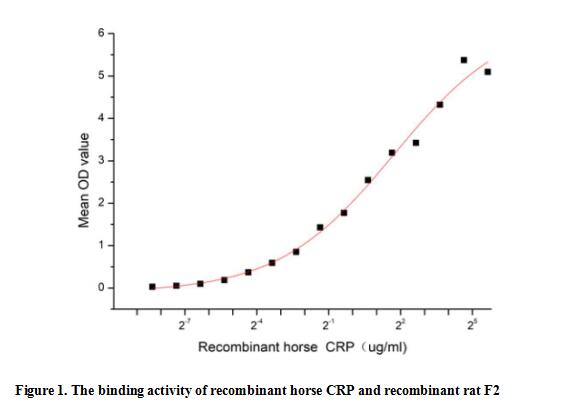Active C Reactive Protein (CRP)
C-RP; PTX1; Pentraxin-Related; Pentraxin 1
- Product No.UAPA821Eq01
- Organism SpeciesEquus caballus; Equine (Horse) Same name, Different species.
- Buffer FormulationPBS, pH7.4, containing 0.01% SKL, 5% Trehalose.
- TraitsFreeze-dried powder
- Purity> 90%
- Isoelectric Point5.3
- ApplicationsCell culture; Activity Assays.
- Download Instruction Manual
- UOM 10µg50µg 200µg 1mg 5mg
-
FOB
US$ 136
For more details, please contact local distributors!US$ 340
For more details, please contact local distributors! US$ 680
For more details, please contact local distributors! US$ 2040
For more details, please contact local distributors! US$ 5100
For more details, please contact local distributors!
ACTIVITY TEST of the Active C Reactive Protein (CRP)

C reactive protein (CRP) is an annular (ring-shaped), pentameric protein found in blood plasma, whose levels rise in response to inflammation. It is an acute-phase protein of hepatic origin that increases following interleukin-6 secretion by macrophages and T cells. Its physiological role is to bind to lysophosphatidylcholine expressed on the surface of dead or dying cells (and some types of bacteria) in order to activate the complement system via C1q. Besides, Coagulation Factor II (F2) has been identified as an interactor of CRP, thus a functional binding ELISA assay was conducted to detect the interaction of recombinant horse CRP and recombinant rat F2. Briefly, CRP was diluted serially in PBS with 0.01% BSA (pH 7.4). Duplicate samples of 100 μl were then transferred to F2-coated microtiter wells and incubated for 1h at 37℃. Wells were washed with PBST and incubated for 1h with anti-CRP pAb, then aspirated and washed 3 times. After incubation with HRP labelled secondary antibody for 1h at 37℃, wells were aspirated and washed 5 times. With the addition of substrate solution, wells were incubated 15-25 minutes at 37℃. Finally, add 50 µL stop solution to the wells and read at 450/630 nm immediately. The binding activity of recombinant horse CRP and recombinant rat F2 was shown in Figure 1, the EC50 for this effect is 3.29 ug/mL.
USAGE of the Active C Reactive Protein (CRP)
Reconstitute in 10mM PBS (pH7.4) to a concentration of 0.1-1.0 mg/mL. Do not vortex.
STORAGE of the Active C Reactive Protein (CRP)
Avoid repeated freeze/thaw cycles. Store at 2-8°C for one month. Aliquot and store at -80°C for 12 months.
STABILITY of the Active C Reactive Protein (CRP)
The thermal stability is described by the loss rate. The loss rate was determined by accelerated thermal degradation test, that is, incubate the protein at 37°C for 48h, and no obvious degradation and precipitation were observed. The loss rate is less than 5% within the expiration date under appropriate storage condition.
INCREMENT SERVICES
BCA Protein Quantification Kit
Molecular Mass Marker for Protein
Monoclonal Antibody Customized Service
Polyclonal Antibody Customized Service
Protein Activity Test Experiment Service
Electrophoretic Mobility Shift Assay (EMSA) Experiment Service
Buffer
Lentivirus Packaging Experiment Service
Adenovirus Packaging Experiment Service
Real Time PCR Experimental Service
Spike RBD Protein (S-RBD)
Protein G
Protein A
Related products
| Catalog No. | Organism species: Equus caballus; Equine (Horse) | Applications (RESEARCH USE ONLY!) |
| URPA821Eq01 | Recombinant C Reactive Protein (CRP) | Positive Control; Immunogen; SDS-PAGE; WB. |
| UAPA821Eq01 | Active C Reactive Protein (CRP) | Cell culture; Activity Assays. |
| UPAA821Eq01 | Polyclonal Antibody to C Reactive Protein (CRP) | WB |



